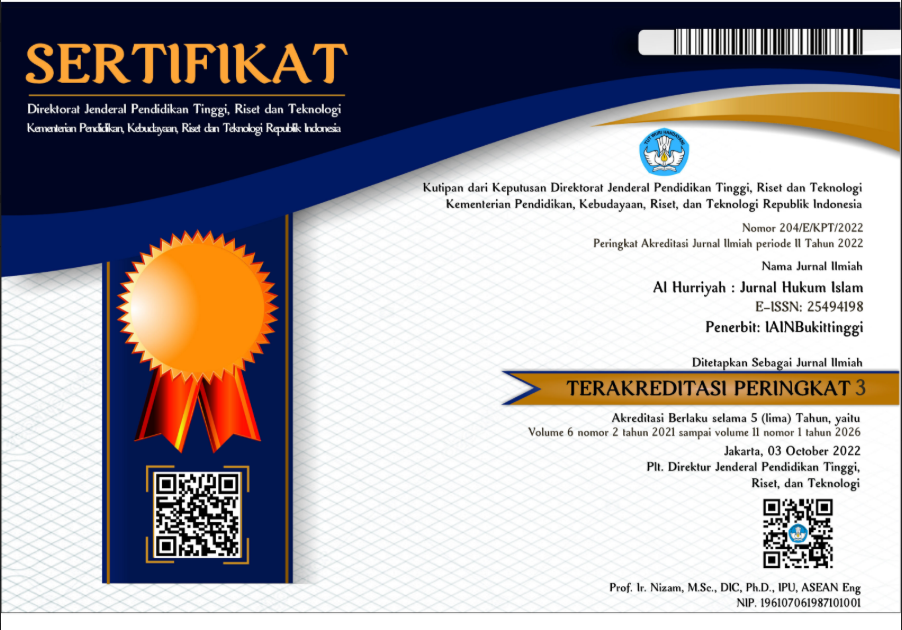TEORI HUKUM JA’FARIYAH (Analisis Historis Mazhab Fikih Ja’far As-Shadiq Dan Implikasinya Pada Produk Hukumnya)
DOI:
https://doi.org/10.30983/alhurriyah.v3i2.749Abstract
References
Abu Zahrah, Muḥammad, Tarikh al-Madhahib al-Islamiyyah, jilid II, Beirut: Dar al-Fikr al-‘Arabi, t.th.
al-‘Asqalani, Shihab al-Din Abu al-Faá¸l Aḥmad ibn ‘Ali ibn Ḥajar, Tahdhib al- Tahdhib, jilid I, t.tp. : Dar al-Kitab al-Islami, t.th.
al-Andalusi, al-Imam Abu Muḥammad ‘Ali ibn Aḥmad ibn Sa’id ibn Hazm,
Asḥab al-Futya min al-á¹¢aḥabah wa al-Tabi’in wa Man Ba’dahum ‘alaMaratibihim fÄ« Kathrati al-Futya, Beirut: DÄr al-Kutb al-‘Ilmiyyah, 1415/1995.
AmÄ«n, Aḥmad, Fajr al-IslÄm, t.tp: DÄr al-Kutb, 1975.
Dahal, Abdul Azis, (ed.), Ensiklopedi Hukum Islam, jilid 3, Jakarta: Ichtiar Baru van Hoeve, 1996.
Fadlullah, Sayyid Muhammad Husain, Dunia Wanita dalam Islam, terj.
Muhammad Abdul Qadir Alkaf, Jakarta: Lentera, 2000.
Glasse, Cyril, Ensiklopedi Islam (Ringkas), terj. Ghufron A. Mas’adi, ed. I, Jakarta: Raja Grafindo Persada, 1999.
Ḥakīm, ‘Abd al-Ḥamid, al-Bayan, Jakarta: Maktabah al-Sa’diyyah, t.th.
Hughes, Thomas Patrick, Dictionary of Islam, New Delhi: Cosmo Publications, 1982.
KhallÄf, ‘Abd al-WahhÄb, ‘Ilm al-Uá¹£ul Fiqh, Beirut: Dar al-Qalam, 1978/1398. Mughniyyah, Muḥammad Jawwad, Fiqh Imam Ja’far á¹¢adiq, terj. Samsuri Rifa’i,
dkk., Jakarta: Lentera Basritama, 1999.
Muthahhari, Murtadha, Hak-hak Wanita dalam Islam, terj. M. Hashem, Jakarta: Lentera, 2001.
Muthahhari, Murtadha, Imamah dan Khilafah, terj. Satrio Pinandito, Jakarta: Firdaus, 1991.
Rahman, Fazlur, Islam, terj. Ahsin Mohammad, Bandung: Pustaka, 1997. Sabiq, Sayyid, Fiqh al-Sunnah, jilid II, Beirut: DÄr al-Fikr, 1983/1403.
Shaban, M.A., Sejarah Islam: (Penafsiran Baru) 600-750, terj. Machnun Husein, Jakarta: Raja Grafindo Persada, 1993.
al-Sharbini, ‘Abdurraḥman, Ḥashiyah al-‘Allamah al-Bannani ‘ala Matn Jam’ al- Jawami’, juz II, Indonesia: Maktabah Dar Iḥya’ al-Kutb al-‘Arabiyyah, t.th.
Yatim, Badri, Sejarah Peradaban Islam, Jakarta: Raja Grafindo Persada, 2000.
Downloads
Published
How to Cite
Issue
Section
Citation Check
License
Authors who publish with this journal agree to the following terms:
- Authors retain copyright and grant the journal right of first publication with the work simultaneously licensed under a Creative Commons Attribution-ShareAlike 4.0 International License that allows others to share the work with an acknowledgment of the work's authorship and initial publication in this journal.
- Authors are able to enter into separate, additional contractual arrangements for the non-exclusive distribution of the journal's published version of the work (e.g., post it to an institutional repository or publish it in a book), with an acknowledgment of its initial publication in this journal.
- Authors are permitted and encouraged to post their work online (e.g., in institutional repositories or on their website) prior to and during the submission process, as it can lead to productive exchanges, as well as earlier and greater citation of published work (See The Effect of Open Access).





